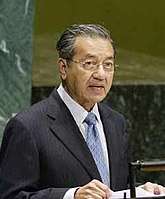- ↑ Contested using dacing election symbol on the ballot papers.
- ↑ Contested using dacing election symbol on the ballot papers.
- ↑ Contested using dacing election symbol on the ballot papers.
- ↑ Contested using dacing election symbol on the ballot papers.
Summary of the 29 November 1999 Malaysian Dewan Rakyat election results in Penang
| Party |
Candidates |
Vote |
Seats |
| Votes |
% |
Won |
% |
+/– |
|
National Front[lower-alpha 1] | BN | 11 | 247,870 | 51.36 | 6 | 54.55 | -2 |
|
|
Malaysian Chinese Association | MCA | 3 | 84,698 | 17.55 | 1 | 9.09 | -1 |
|
Malaysian People's Movement Party | Gerakan | 4 | 83,607 | 17.32 | 2 | 18.18 | 0 |
|
United Malays National Organisation | UMNO | 4 | 79,565 | 16.49 | 3 | 27.27 | -1 |
|
Democratic Action Party | DAP | 7 | 169,973 | 35.22 | 4 | 36.36 | +1 |
|
National Justice Party | KeADILan | 3 | 54,987 | 11.39 | 1 | 9.09 | New |
|
Pan-Malaysian Islamic Party | PAS | 1 | 8,810 | 1.83 | 0 | 0.00 | 0 |
|
Independents | IND | 1 | 942 | 0.20 | 0 | 0.00 | 0 |
| Valid votes | 482,582 | |
| Invalid/blank votes | 12,355 |
| Total votes (voter turnout: 76.68%) | 494,937 | 100.00 | 11 | 100.00 | 0 |
| Did not vote | 150,514 | |
| Registered voters | 645,451 |
| Voting age population (aged 21 years and above) | |
| Penang's population | |
|
Source: |
- ↑ Contested using dacing election symbol on the ballot papers.
- ↑ Contested using dacing election symbol on the ballot papers.
- ↑ Contested using dacing election symbol on the ballot papers.
- ↑ Contested using dacing election symbol on the ballot papers.
Template:Malaysian general election, 1999 (Kuala Lumpur)
- ↑ Contested using dacing election symbol on the ballot papers.
- ↑ Contested using dacing election symbol on the ballot papers.
- ↑ Contested using dacing election symbol on the ballot papers.
Template:Malaysian general election, 1999 (Labuan)
- ↑ Contested using dacing election symbol on the ballot papers.
Summary of the 29 November 1999 Malaysian Dewan Rakyat election results in Sarawak
| Party |
Candidates |
Vote |
Seats |
| Votes |
% |
Won |
% |
+/– |
|
National Front[lower-alpha 1] | BN | 28 | 338,013 | 65.95 | 28 | 100.00 | +2 |
|
|
Sarawak United People's Party | SUPP | 7 | 129,356 | 25.24 | 7 | 25.00 | 0 |
|
United Traditional Bumiputera Party | PBB | 10 | 100,062 | 19.52 | 10 | 35.71 | +1 |
|
Parti Bansa Dayak Sarawak | PBDS | 6 | 51,749 | 10.10 | 6 | 21.43 | 0 |
|
Sarawak National Party | SNAP | 4 | 45,519 | 8.88 | 4 | 14.29 | 0 |
|
Barisan Nasional Direct Candidate | | 1 | 11,327 | 2.21 | 1 | 3.57 | |
|
Democratic Action Party[lower-alpha 2] | DAP | 7 | 75,992 | 14.81 | 0 | 0.00 | New |
|
National Justice Party[lower-alpha 2] | KeADILan | 13 | 49,774 | 9.71 | 0 | 0.00 | New |
|
State Reform Party | STAR | 4 | 23,048 | 4.50 | 0 | 0.00 | New |
|
Pan-Malaysian Islamic Party[lower-alpha 2] | PAS | 1 | 2,438 | 0.48 | 0 | 0.00 | 0 |
|
Independents | IND | 12 | 23,332 | 4.55 | 0 | 0.00 | 0 |
| Valid votes | 512,527 | |
| Invalid/blank votes | |
| Total votes (voter turnout: %) | | 100.00 | 28 | 100.00 | +1 |
| Did not vote | | |
| Registered voters | |
| Voting age population (aged 21 years and above) | |
| Sarawak's population | |
|
Source: |
- ↑ Contested using dacing election symbol on the ballot papers.
- 1 2 3 Parties in the informal coalition, Alternatif Front (Barisan Alternatif). Contested using separate election symbol on the ballot papers.
|

